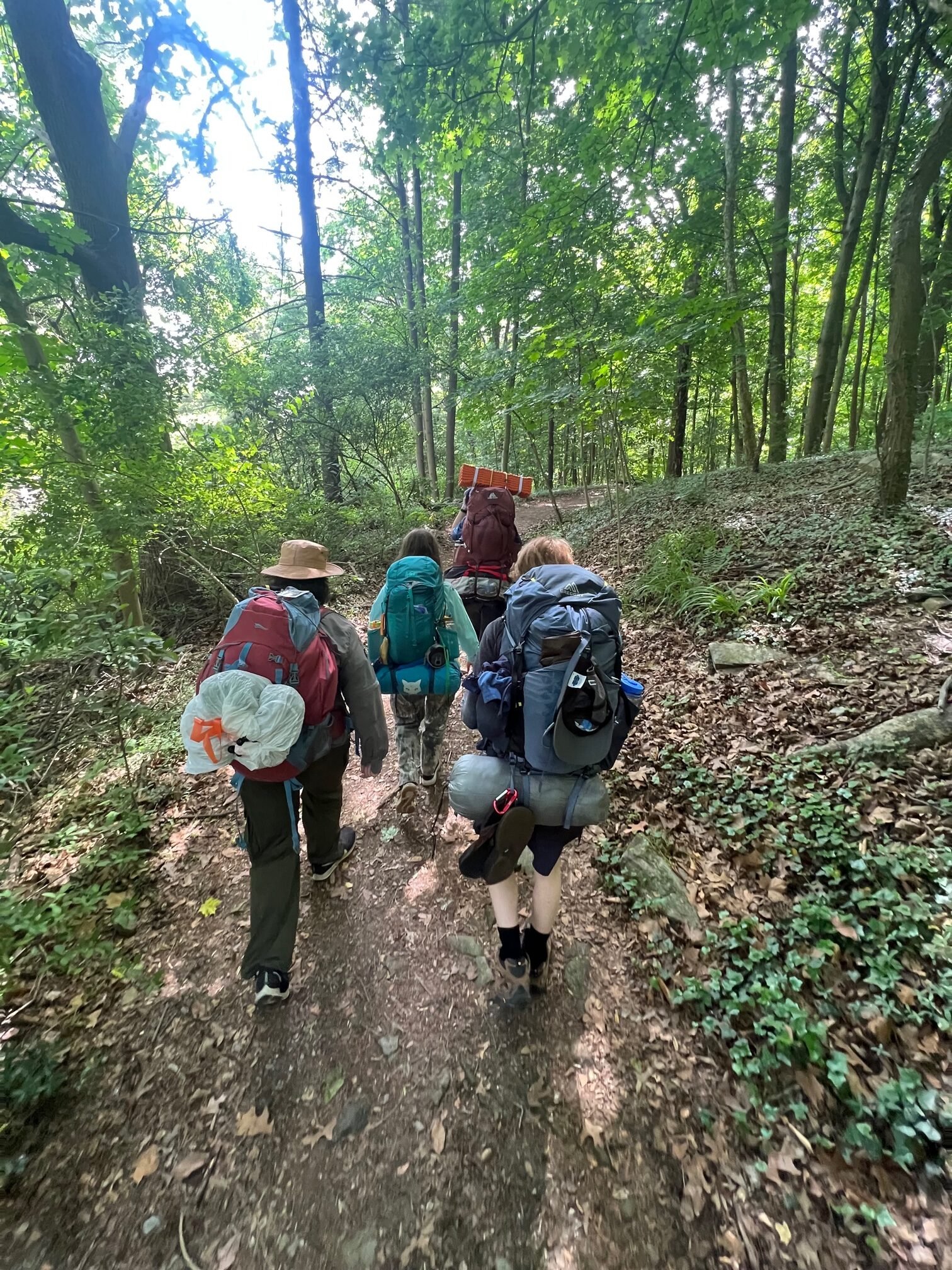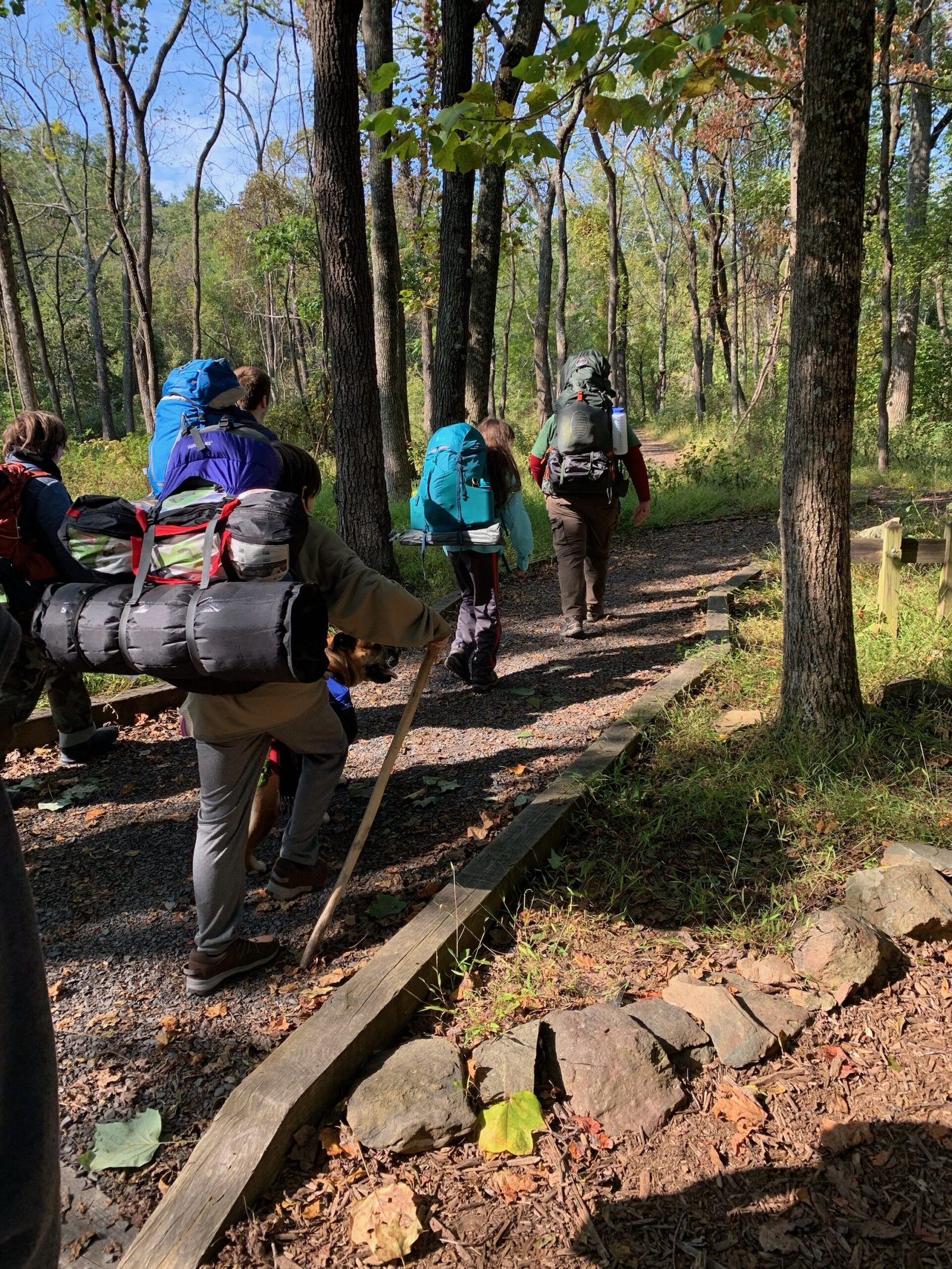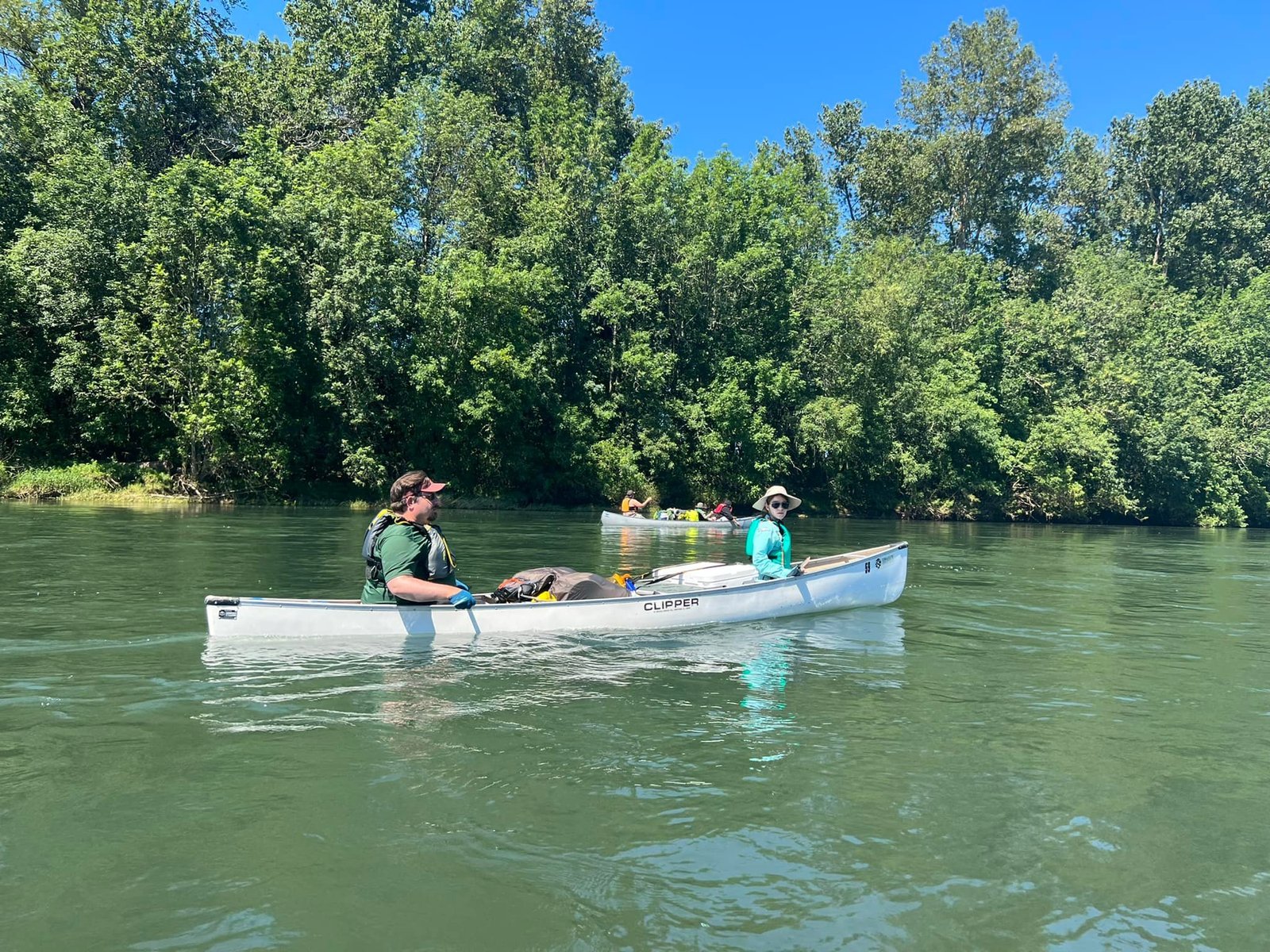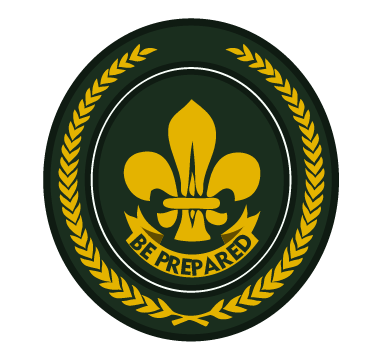Pathfinders: The Journey to First Class
In Outdoor Service Guides, one of the biggest achievements a pathfinder can attain is earning First Class. Attaining First Class is comprised of two pieces. 
One is that pathfinders complete a set of requirements that are much like Second Class. They learn first aid and advanced scouting skills. The second part, is that they complete a First Class Journey.
The requirements for First Class must be attained before the pathfinder sets out on the journey. This means they have several skills to learn and that they must earn the First Aid badge. If you have a group of pathfinders who have completed Second Class, you should start looking at the requirements for First Class, even if they are not ready for that step yet. You may need to learn skills on that list, so you can teach them, or find other adults with those skills who can teach them. You can start adding some of those skills to their camping trips and meetings here and there, so that when they start considering wanting to take the First Class journey, they have already completed several of the requirements.
It is important that as a leader, you understand that this journey should be a cumulation of skills learned and something the scout is prepared to undertake. This means that if your pathfinder will complete it backpacking, you have taken them backpacking and taught them the skills needed for backpacking. If they will complete it by boat, bike, or horse, they should have a high comfort level with traveling that way and know how to store each of those for the night. While you may love riding a bike in the mountains, it is different when it is loaded down with gear so practice is the key to success.
Badges to Help Them Prepare
Before taking the First Class Journey, guides should earn the Camper badge, and at least one of these three: Cycling Camper, Nautical Camper, or Backpacker. These skills will prepare scouts for successful completion of their journey. If you aren’t sure how to prepare a pathfinder to be ready to take a First Class journey, working through these badges, and others in the Outdoor section of the handbook will help.
The Camper badge can be earned by pathfinders who have just completed Second Class and are still learning basic camping skills. Honestly, every group should make it a priority to give their pathfinders the opportunity to earn the Camper badge. As a Pathfinder leader, planning camping trips and making sure your pathfinders work on those skills while camping is important.
If your pathfinders are interested in backpacking, your next goal should be looking at the Hiker and Backpacker badges for the next step in their development of camping skills. If your group has never backpacked before, many pathfinders have not, start with teaching the basics. Bring in a backpack and explain what to take and how to pack your gear.
A favorite activity for a meeting is to bring in 2 backpacks. One is packed with good choices for backpacking and all the essentials and the other has crazy things that are poor choices, such as a 2 liter bottle of soda, heavy cookware, clothes that are fashionable but not practical, toys, and other unnecessary items. Silly items are great because they are memorable. You may even want to have one pack have a heavy flashlight while the other has a light weight one, so they can discuss how you make choices to lighten your load. Have your guides unpack both packs and then tell them to pack one with the “best choices” for a weekend of camping. Then they will need to unpack the pack and explain their choices to the group. We do this activity by patrol or in small groups. It helps pathfinders learn what to take when and it is low stress. If they make a poor choice, we can discuss it, rather than deal with it on a camping trip. Keeping these lessons fun, is essential to keeping younger pathfinders engaged long enough to become First Class Guides.
Another great meeting is one where you teach pathfinders how to figure out if a backpack is a good fit. This is a great choice if your pathfinders are new to backpacking and all need to purchase packs. Stores like REI will often agree to help with this and do fittings on your entire patrol. They also offer backpacks that are designed to be adjusted and grow with youth, which can save parents a lot of money. This meeting is also helpful so that pathfinders learn how a backpacking pack is different from a lighter weight day pack or school backpack.
Biking and Boating
If your pathfinders are more interested in canoe camping or bicycle camping, there are badges for those skills too. Working on earning those are also a valid way to prepare for a First Class Journey. Pathfinders who are smaller of stature may find that camping with a bike or canoe is easier for them than trying to carry all their gear on their backs. Learning about how to choose gear for those types of trips and how to pack for them is different than backpacking. However, they will still need to practice and develop the skills needed to complete the journey with the method they choose. Once again, if you are not experienced, consider seeking out either scout leaders or resources to prepare you to help your scouts. REI offers classes in bicycle camping that was very helpful for one First Class Pathfinder I know. She attended the classes with her father who was also her scout leader and they both learned about the differences in gear needed for bike camping.
Taking Time
How long should a scout leader expect it to take to prepare kids for finishing First Class? Several years. The vast majority of eleven year old pathfinders need a lot of time to build skills and mature before they will be ready for a First Class Journey. This is the beauty of having a program where they can work on the necessary skills by earning badges with their patrol. Achieving the number of night’s camped to earn each of the badges listed above will take time. This means your pathfinders have reasonable goals to work towards, and that fill time while they mature.
The majority of pathfinders earning First Class in OSG have been 16-17 years old with many years of experience with their group and with camping. That does not mean that an exceptional pathfinder can’t earn it earlier, but that you shouldn’t expect it. Pathfinders who earn it at a younger age, tend to have parents who are very involved in helping them gain the skills they need. They also may be younger siblings of pathfinders, who have tagged along for adventures and thus have more scouting experience than is typical for their age.
Remember, scouting is supposed to be FUN, so don’t worry if your pathfinders are not making much progress towards First Class, and are instead perfecting their s’mores skills right now. Having a desire to earn First Class usually comes with age. Older pathfinders want to prove themselves and show off their skills. Wait until they show signs they are ready for bigger challenges or are already demonstrating that they are ready for a FCJ.
You may also have some pathfinders who are never going to become First Class. That is okay. The joy and lessons of scouting are not limited to the exceptional- but are for every kid. In our group, we have some pathfinders who want to backpack and earn those higher level awards and some who don’t even like to sleep in the wood. We try to plan a mix of activities that appeal to everyone and some events that we know not every pathfinder will attend. It can be a lot of work for scout leaders to plan both, so try to add leaders who can help support your group and take turns with planning.
First Class Journey
The requirements of the first class journey are: Go on foot or by rowing a boat or canoe, alone or with another Scout, for a total distance of fourteen miles, OR ride an animal or bicycle (not motor) a distance of 25 miles. The journey should occupy about twenty-four hours and a camping kit for the night must be taken and used. Whenever possible, the campsite must be of the Scout’s own choosing, and not where other Scouts are camping. Their Scoutmaster or Examiner may indicate the route and suggest the approximate area, but not the actual position where the Scout will make camp. This test should normally be the final one taken for the First Class badge. ~ Pathfinder Handbook
The First Class Journey is a trip a pathfinders takes where they are completely self sufficient. The pathfinder must backpack, bike pack, or take a canoe journey where they travel a minimum of so many miles and camp over night, preparing their own food. The pathfinder handbook has the details of mileage, but it is important to realize that as the examiner, you can reduce the exact mileage if the terrain is difficult or the pathfinder has special needs.
You may also choose to allow more than 2 pathfinders to do their journey together if you feel it is best for their safety. Keep in mind, they need to each bring all the gear they need, and not rely on others to share gear for this trip. Remember, that approaching parents and asking if 2 young female pathfinders can make this journey alone may cause them a great deal of concern about safety that has nothing to do with scouting. Allowing them to go with an additional pathfinder or two may help. In my group, we recently had 2 female and 2 male pathfinders to travel together for their FCJ. Parents of the female scouts were much more comfortable having this combination as the female scouts have each other and the male scouts all for safety from human predators which was their biggest concern.
This First Class Journey should be a challenge for your pathfinder, but not impossible. For a pathfinder to prepare for a journey like this, they will need to take similar trips with your group first, with help. The group may go on camping trips together that are fewer miles, or with shared gear that the pathfinder won’t have on their official journey. Rare is the pathfinder who will want to make a First Class Journey if they have never been backpacking or similar. They need to practice with their troop, and with your guidance the skills they will need for this journey.
Keep in mind when planning your group’s first ever backpacking trip, that it is the first one ever. Plan a hike that is only 1-2 miles, so if your pathfinders show up with poorly packed or crazy gear, they can make it to camp and back carrying their full sized keyboard, or whatever weird thing they brought. (Yes, I do know of a pathfinder that did this on his first trip, it was a learning experience.) Gradually, you can increase miles and attempt different terrain or new challenges with your group. Every single night in the woods counts as a night of camping! Even if they are not pushing themselves. Also, remember to let your pathfinders have input in how far they want to hike and where. You might feel they can do more, but if they don’t feel ready, there is no reason to make a trip less fun by increasing the challenge beyond what they want to do.
If your pathfinder will complete the trip by horse, kayak, canoe or bike, they will need to build the muscles and skills to do a trip that way. Consider having them travel at least part of their planned route by their preferred method before taking on the full journey. Test out the trail or river. Build the skills and muscles needed. They can also gain confidence about the trail or area they will travel. There is no reason a First Class Journey should be the first time a Pathfinder is on a specific trail. Familiarity is a form of safety.
You will need to be a resource person for your pathfinders and figure out how to support them best on this trip. If your pathfinder is able to complete their journey with a group on private land, you may need to only “accidentally” bump into them on their trip so you can make sure they are fine. If they will camp in a state or national park, you may need to plan to have approved adults supervising them, as minors may be unable to rent a campsite. If possible, get leaders from another section or even another OSG group to be the supervising adults for the night. These adults should not help the pathfinders, unless there is an emergency, but be close enough for safety. They also should not need to hike with the pathfinders, unless there are special circumstances with safety or special needs accommodations to be made. For most parents, their greatest fear with a FCJ is not that the pathfinders will deal with wild animals, but instead will have to deal with humans, who are far more dangerous than bears.
Ceremonies and Awards
Earning First Class is a very big deal and you should plan an awards ceremony with your group. Give your pathfinders a chance to plan their ceremony, if you can. Also, make time for them to tell the tale of their journey to the group. If multiple pathfinders competed their journey together, they may want to agree beforehand who will share what details.
The First Class badge is a green ring of gold laurel leaves that goes around the Second Class badge. The theme of a ring of laurel leaves makes for a nice idea when choosing decorations with colors in green and gold. You can also award your pathfinder a green cord to wear, for completing First Class. Directions to make one, are in the Pre-release Pathfinder Badge book, and will be in the new Pathfinder Handbook when it is released.



